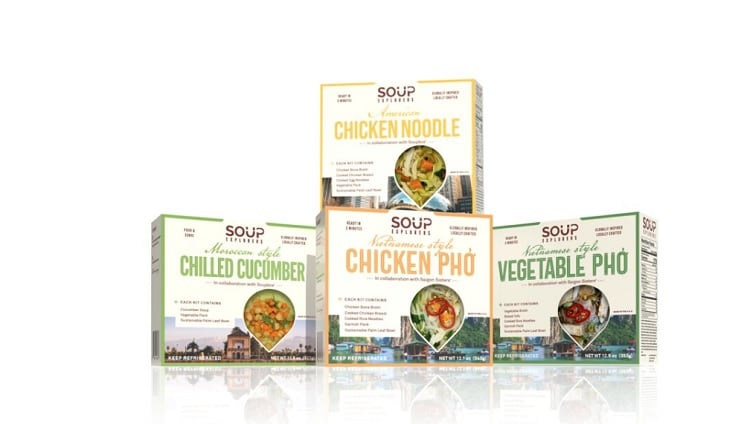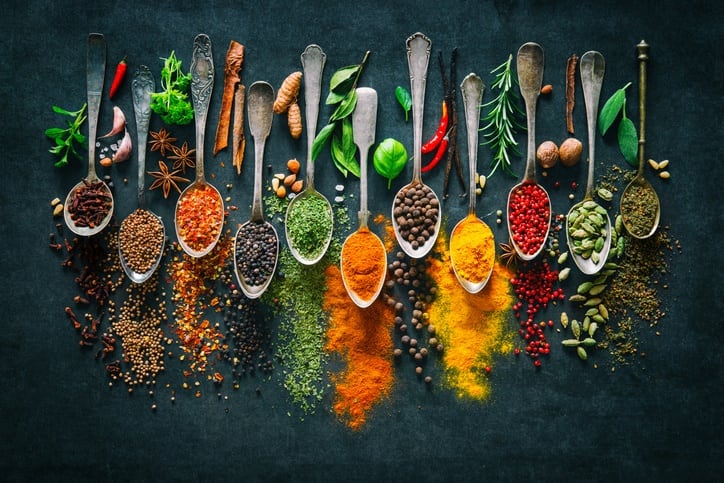“When you order Vietnamese pho at a restaurant you feast with your eyes, nose and mouth. They give you a hot bowl of broth and the noodles and meat. Then there is a side of fresh garnishes – bean sprouts, basil, cilantro and jalapeno pepper. So, you have aroma of the broth mixing with the fresh garnishes and you get to put it all together in a way that you like,” Soup Explorers co-founder Debarshi Sengupta explained to FoodNavigator-USA.
But, he added, when the same meal is delivered to a home from a restaurant it may be already combined and the garnishes and noodles are no longer crisp and fresh, and the protein may be overcooked or soggy. Similarly, the vegetables and noodles in canned or chilled soups at grocery stores often are soggy either from the processing or from sitting too long in broth, he said.
“We wanted to stay true to the authentic experience of ordering soup at a restaurant, but transfer it into a retail shelf concept that people can buy, bring home and prepare in three minutes without sacrificing the experience, texture or taste. And the way we were able to do that was to use cold pasteurization or cold press technology to create a kit of four elements: broth, cooked proteins, cooked noodles and garnishes,” Sengupta said.
He explained that cold pasteurization allows the young company to extend the shelf life of its kits, increase food safety and preserve the nutrients of the ingredients.
“The real clincher of the technology though, is when you open the garinish pack and you are hit with the aroma of basil, green onions, napa cabbage and other fresh components that when you add to the broth create a burst of flavor and aroma” that can transport you to a restaurant or another culture while still staying at home, he said.
In addition to offering a Vietnamese style chicken or vegetable pho created with the restaurateurs at Saigon Sisters, Soup Explorers also worked with Jamie Taerbaum of Soupbox to create a Moroccan style chilled cucumber soup and American chicken noodle soup.
Brand building as a team effort
Teaming with local chefs not only helped Soup Explorers create authentic tasting soups, but also create brand awareness, credibility and trust first through the chefs and then through their “really, really awesome loyal followings,” who all could become brand ambassadors for the young company by helping to share through word of mouth their products, said Soup Explorer co-founder Linda Yeh-Ostrinsky.
In addition, the brand is building awareness by being “loud and proud Chicago,” Yeh-Ostrinsky said. “This is a tough city, but it’s a tight city and we wanted to make sure we were working locally with our local community, not only from the restaurant partnerships, but also how we supply our ingredients.”
This includes participating in Chicago’s Good Foods Accelerator’s sixth cohort, which Sengupta said gives Soup Explorers “a stamp of credibility for all our brand values and the proposition by someone outside of just the consumer having a bowl of soup. It shows we are resonating with the community of people who have been there, done that and, now like us, who’ve toed the path as entrepreneurs of a CPG company.”
A growing category
While soup is a staple for many households, the co-founders of Soup Explorers saw significant potential not only to disrupt the delivery and taste experience of the category with its HPP meal kits, but also enter a fast-growing segment.
According to Sengupta, the soup category is worth about $6.5bn at retail, but in recent years growth has been flat at about 1.1% -- illustrating that while many consumers regularly purchased the product, they weren’t inspired to invest heavily in the space.
The one exception was the refrigerated soup segment, which grew 18% in 2019 over the prior year, according to IRI data, Sengupta said. This was up slightly from the 16% increase over the prior year and the 15% from the year before that.
Much of this growth was led by private label products, which increased about 17% in 2019, with the first “real branded player being Panera At Home,” which in the timeframe sold about $117m in revenue, Sengupta said.
“We just saw there was phenomenal growth in this space,” but not many brands – which left the space wide open for Soup Explorers, he added.
3 targeted strategies for success
To make the most of the category’s potential as a small, but emerging brand, Sengupta and Yeh-Ostrinsky have taken a disciplined approach that is highly focused on its target consumer and not allowing the brand to drift too far from what she needs.
“You can’t cater to everyone. You need to have a really strategic target in mind, while also bringing along the broader consumption base. So, for us, we … landed on the millennial female who loves international flavors and has maybe traveled, but who is super busy and also looking for a well-balanced meal for days when she can’t go out for lunch or needs something quick to eat at home,” Yeh-Ostrinsky said.
“Staying focused on our clear consumer target has really helped us prioritize” where we innovate and where we hit pause, she added. For example, while the soups are healthy the company does not offer a low-sodium option because this is not a top value for its target consumer.
Sengupta added that the brand has further prioritized where to invest and innovate by always asking if a change or recipe or new product is scalable beyond the small Chicago community.
“Eventually, we have to make this into a scalable, profitable business for all of our stakeholders. So, we always try to balance the front-end demand with the production needs and in a way that is sustainable for the long term,” he said.
The duo also applies this same tight, targeted approach to its communication with retail buyers, Yeh-Ostrinsky said. She explained that when meeting with buyers, she always gives them a detailed one-sheeter with all the key information about the brand, its consumers and where it sits in the competitive field so that after the meeting, when they are deciding what to purchase, they have a quick cheat sheet to help them remember the benefits of Soup Explorers.




